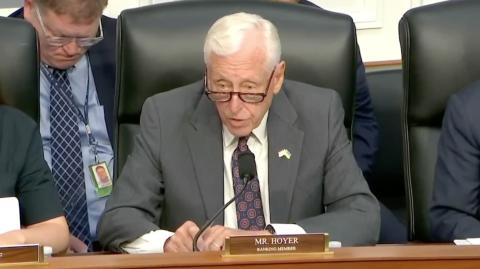Ranking Member Hoyer Opening Remarks at FSGG Hearing on FCC's Fiscal Year 2025 Budget Request
WASHINGTON, DC – Congressman Steny H. Hoyer (MD-05), Ranking Member of the Financial Services and General Government (FSGG) Subcommittee, delivered opening remarks today at FSGG's Budget Hearing on the Federal Communications Commission's (FCC) Fiscal Year 2025 Request. Below is a transcript of his remarks and a link to the video:

Click here for a link to the video.
“Thank you very much, Mr. Chairman. Welcome [Mr. Carr] and Ms. Rosenworcel – tough name, sort of like Steny, you never get it at the first time.
“When the Communications Act of 1934 established the Federal Communications Commission, it defined the agency’s mission ‘to ensure that the American people have available – at reasonable costs and without discrimination – rapid, efficient, national, and world-wide communication services.’
“Communications technology of course has changed dramatically in the last ninety years. The FCC’s work is even more important, increasingly important today, than it was nine decades ago. In the twenty-first century, access to economic opportunity clearly depends on the access to high-speed internet. Whether it’s for education, work, or health care, the internet is no longer a luxury; it is a necessity. One could say that separately about the telephone, for a long period of time, and now our cellphones.
“Nevertheless, an FCC report released in March found that as many as 24 million Americans still lack access to [high-speed] broadband. The FCC has done an excellent job tracking these gaps in internet coverage within its new National Broadband Map.
“America’s digital divide is still too big, but it would be much bigger were it not for the FCC. The FCC has done [a] terrific job, in my opinion, to expand affordable high-speed broadband access throughout the country – especially in rural areas. Although I would note, that we found in big cities there were deserts where they had no access. The FCC’s Affordable Connectivity Program has been central to that effort.
“As of last month, 23 million – or one in every six households in America – were enrolled in the program, saving $30 to $75 a month on their internet costs. That includes 21,036 households in Maryland’s Fifth District, which I’m proud to represent.
“I’ve heard directly from my constituents, Republicans and Democrats officials, about how important the ACP’s positive impact has been on the lives of their citizens.
“Just a few weeks ago, one family down in St. Mary’s County explained to me how they had struggled during the pandemic because they couldn’t afford high-speed internet. Their high-school student had to go to a friend’s house just to attend class and keep up with her studies. Her parents had to drive to the local church parking lot just to get an internet connection to telework. That all changed last year when they were able to get their home connected thanks to the ACP. The family told me: ‘We don’t know what we would have done without the efforts of our government.’
“As House Majority Leader last Congress, I was proud to help secure funding for the ACP in the Bipartisan Infrastructure Law. That funding, however, has run out. It is crucial that my colleagues across the aisle, and on our side, to take immediate action to extend this program.
“If they fail to do so, if we fail to do so, 23 million Americans will either see their internet costs go up or lose connection all together. Additionally, we ought to work with all of us – together— to fulfill the FCC’s Fiscal Year 2025 request of $448 million, which, of course, is fully offset by fees.
“The FCC needs these resources to help close the digital divide and carry out other key duties – from protecting consumers to promoting fair competition in the telecom industry. I thank Chair Rosenworcel and Commissioner Carr for their testifying today. I look forward to hearing them. I look forward to hearing not only about the programs that we've talked about, but such programs that you believe — both believe — are critically important to focus on. Thank you very much Mr. Chairman.”